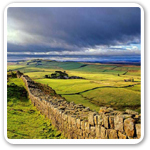 | “The Great Wall Of China” in old chinese it is called Chángchéng; literally “Long wall”). Out of many walls built in those days this is the most famous one. It was built in 200 B.C by the first Emperor of China, Qin Shi Huang. The long wall of 10,000 Li is a series of stone and earthen fortifications in China, built, rebuilt, and maintained between the 5th century BC and the 16th century to protect the northern borders of the Chinese Empire during the rule of successive dynasties. The Great Wall stretches over approximately 6,400 km (4,000 miles) from Shanhaiguan in the east to Lop Nur in the west, along an arc that roughly delineates the southern edge of Inner Mongolia, but stretches to over 6,700 km (4,160 miles) in total. |
 | Hadrian’s Wall is a stone and turf fortification built by the Roman Empire across the width of modern-day England. It was built for peace and economic prosperity. Map showing the location of Hadrian’s Wall Hadrian’s Wall extended west from Segedunum at Wallsend on the River Tyne to the shore of the Solway Firth. |
 | The Western Wall traditionally in Arabic it is called the Waqf Abu Madiyanis, is a Jewish religious site located in the Old City of Jerusalem. In Arabic it is also called Al Buraq. The Western Wall commonly refers to an 187 feet (57 m) exposed section of ancient wall situated on the western flank of the Temple Mount. The wall is the only remaining structure of the ancient Temple of Jerusalem. Inside the courtyard King Solomon’s glorious temple once stood. The temple was destroyed and rebuilt several times until only part of the western wall remained. The wall is just outside of the Temple Mount and is considered to be Judaism’s holiest site. |
Saturday, May 22, 2010

Famous Walls Of The World
Subscribe to:
Post Comments (Atom)
Popular Posts
Powered by Blogger.
Tags
.:: DesiBeats.tk ::.
'
amazing pictures
ar'
Arabian girls
Asian Girls
Beautiful girls
Belly Dance
Bikini girls
Bollywood
Business
Cars
Chinese Girls
Desi aunty
Desi Boys
Desi Facebook
DVDRip
Earn Money
Egypt Girls
Entertainment
Facebook
Faisalabad Girls
Fashion
Food
Friendship
Funny
Girls Jewelry
Hansika Motwani
health Tips
Hollywood Celebrities
hot Desi
Hot Wallpapers
indian Celebrities
Indian Girls
Indian Movies
Irani girls
Islamabad Girls
issues
Jobs
Jordani Girls
Karachi Girls
kuwait girls
Lahore Girls
Libya Girls
Live TV
Mallu Girls
Mobile
Movies Reviews
Neha Sharma
New Indian Model
New Model
News
Pakistani Fashion
Pakistani Girls
Pakistani Scandal
Phil-pine
Politics
Privacy Policy
Punjabi Girls
Punjabi Pakistani Stageshows
Saudi Arabia girls
Scandal
School Girls
Send Your Photos
Shakira
Shoaib Sania
SMS
South indian Celebrities
Sports news
Technology
Turkish Girls
UK Desi
Usa
Wallpapers
WikiLeaks
Most Popular
Blog Archive
Header Ads

About Me
Most Popular
Rain stops play in SL-Windies Test
12:14 PM

Dell Mobiles in India
10:57 AM
Famous Walls Of The World
9:42 AM

Girl in white
4:36 PM
Punjabi Bride (woti) 2
11:37 PM








No comments:
Post a Comment